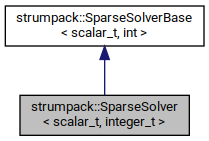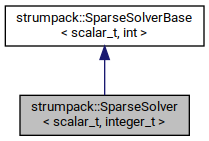|
| | SparseSolver (int argc, char *argv[], bool verbose=true, bool root=true) |
| |
| | SparseSolver (bool verbose=true, bool root=true) |
| |
| | ~SparseSolver () |
| |
| void | set_matrix (const CSRMatrix< scalar_t, integer_t > &A) |
| |
| void | set_csr_matrix (integer_t N, const integer_t *row_ptr, const integer_t *col_ind, const scalar_t *values, bool symmetric_pattern=false) |
| |
| void | set_lower_triangle_matrix (const CSRMatrix< scalar_t, integer_t > &A) |
| |
| void | update_matrix_values (integer_t N, const integer_t *row_ptr, const integer_t *col_ind, const scalar_t *values, bool symmetric_pattern=false) |
| |
| void | update_matrix_values (const CSRMatrix< scalar_t, integer_t > &A) |
| |
| | SparseSolverBase (int argc, char *argv[], bool verbose=true, bool root=true) |
| |
| | SparseSolverBase (bool verbose=true, bool root=true) |
| |
| virtual | ~SparseSolverBase () |
| |
| ReturnCode | reorder (int nx=1, int ny=1, int nz=1, int components=1, int width=1) |
| |
| ReturnCode | reorder (const int *p, int base=0) |
| |
| ReturnCode | factor () |
| |
| void | move_to_gpu () |
| |
| void | remove_from_gpu () |
| |
| ReturnCode | solve (const scalar_t *b, scalar_t *x, bool use_initial_guess=false) |
| |
| ReturnCode | solve (const DenseM_t &b, DenseM_t &x, bool use_initial_guess=false) |
| |
| ReturnCode | solve (int nrhs, const scalar_t *b, int ldb, scalar_t *x, int ldx, bool use_initial_guess=false) |
| |
| SPOptions< scalar_t > & | options () |
| |
| const SPOptions< scalar_t > & | options () const |
| |
| void | set_from_options () |
| |
| void | set_from_options (int argc, char *argv[]) |
| |
| int | maximum_rank () const |
| |
| std::size_t | factor_nonzeros () const |
| |
| std::size_t | factor_memory () const |
| |
| int | Krylov_iterations () const |
| |
| ReturnCode | inertia (integer_t &neg, integer_t &zero, integer_t &pos) |
| |
|
ReturnCode | subnormals (std::size_t &ns, std::size_t &nz) |
| |
|
ReturnCode | pivot_growth (scalar_t &pg) |
| |
| void | draw (const std::string &name) const |
| |
| void | delete_factors () |
| |
template<typename scalar_t, typename integer_t = int>
class strumpack::SparseSolver< scalar_t, integer_t >
SparseSolver is the main sequential or multithreaded sparse solver class.
This is the main interface to STRUMPACK's sparse solver. Use this for a sequential or multithreaded sparse solver. For the fully distributed solver, see SparseSolverMPIDist.
- Template Parameters
-
| scalar_t | can be: float, double, std::complex<float> or std::complex<double>. |
| integer_t | defaults to a regular int. If regular int causes 32 bit integer overflows, you should switch to integer_t=int64_t instead. This should be a signed integer type. |
- See also
- SparseSolverMPIDist
template<typename scalar_t , typename integer_t = int>
| void strumpack::SparseSolver< scalar_t, integer_t >::set_csr_matrix |
( |
integer_t |
N, |
|
|
const integer_t * |
row_ptr, |
|
|
const integer_t * |
col_ind, |
|
|
const scalar_t * |
values, |
|
|
bool |
symmetric_pattern = false |
|
) |
| |
Associate a (sequential) NxN CSR matrix with this solver.
This matrix will not be modified. An internal copy will be made, so it is safe to delete the data immediately after calling this function. See the manual for a description of the CSR format. You can also use the CSRMatrix class.
- Parameters
-
| N | number of rows and columns of the CSR input matrix. |
| row_ptr | indices in col_ind and values for the start of each row. Nonzeros for row r are in [row_ptr[r],row_ptr[r+1]) |
| col_ind | column indices of each nonzero |
| values | nonzero values |
| symmetric_pattern | denotes whether the sparsity pattern of the input matrix is symmetric, does not require the matrix values to be symmetric |
- See also
- set_matrix
template<typename scalar_t , typename integer_t = int>
This can only be used to UPDATE the nonzero values of the matrix. So it should be called with exactly the same sparsity pattern as used to set the initial matrix (using set_matrix or set_csr_matrix). This routine can be called after having performed a factorization of a different matrix with the same sparsity pattern. In that case, when this solver is used for another solve, with the updated matrix values, the permutation vector previously computed will be reused to permute the updated matrix values, instead of recomputing the permutation. The numerical factorization will automatically be redone.
- Parameters
-
| A | Sparse matrix, should have the same sparsity pattern as the matrix associated with this solver earlier. |
- See also
- set_csr_matrix, set_matrix
template<typename scalar_t , typename integer_t = int>
| void strumpack::SparseSolver< scalar_t, integer_t >::update_matrix_values |
( |
integer_t |
N, |
|
|
const integer_t * |
row_ptr, |
|
|
const integer_t * |
col_ind, |
|
|
const scalar_t * |
values, |
|
|
bool |
symmetric_pattern = false |
|
) |
| |
This can only be used to UPDATE the nonzero values of the matrix. So it should be called with exactly the same sparsity pattern (row_ptr and col_ind) as used to set the initial matrix (using set_matrix or set_csr_matrix). This routine can be called after having performed a factorization of a different matrix with the same sparsity pattern. In that case, when this solver is used for another solve, with the updated matrix values, the permutation vector previously computed will be reused to permute the updated matrix values, instead of recomputing the permutation. The numerical factorization will automatically be redone.
- Parameters
-
| N | Number of rows in the matrix. |
| row_ptr | Row pointer array in the typical compressed sparse row representation. This should be the same as used in an earlier call to set_csr_matrix. |
| col_ind | Column index array in the typical compressed sparse row representation. This should be the same as used in an earlier call to set_csr_matrix. |
| values | Array with numerical nonzero values for the matrix, corresponding to the row_ptr and col_ind compressed sparse row representation. |
| symmetric_pattern | Denotes whether the sparsity pattern of the input matrix is symmetric, does not require the matrix values to be symmetric |
- See also
- set_csr_matrix, set_matrix


 Public Member Functions inherited from strumpack::SparseSolverBase< scalar_t, integer_t >
Public Member Functions inherited from strumpack::SparseSolverBase< scalar_t, integer_t >